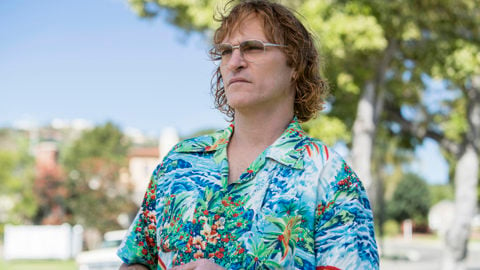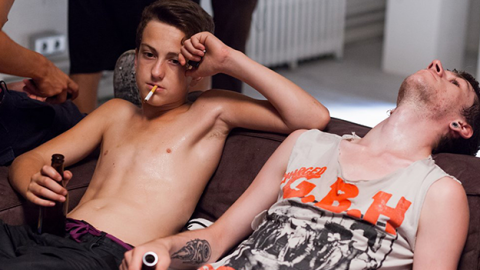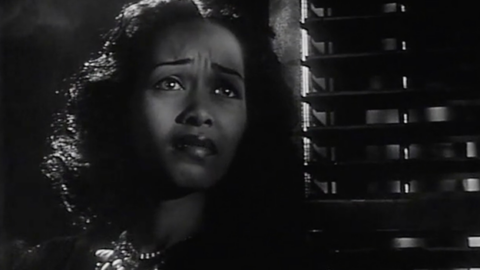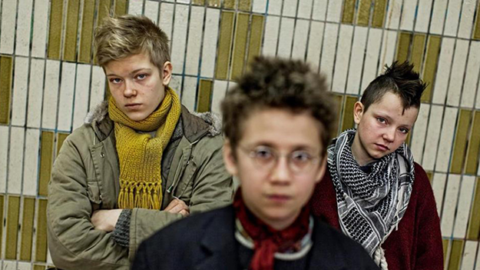Deep Focus: Mid90s
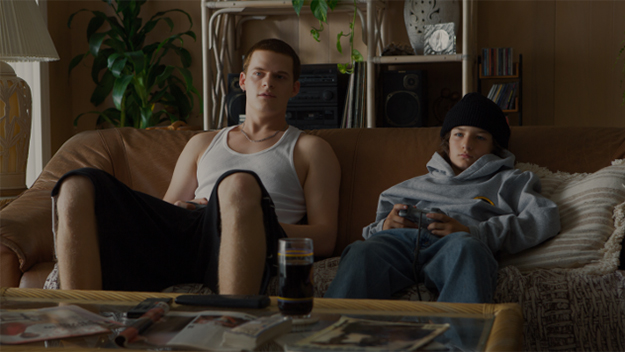
Contemporary comic actors in dramatic roles can bring extra fillips of observation and vitality to them. They know how to use their super-sensitive antennae for the foibles and energy-packed stress-points of modern life to connect to audiences with an uncanny directness, even without laughs. Great performers like Robin Williams in Moscow on the Hudson and Eddie Murphy in Dreamgirls sink deeply into their parts without losing their transcendent bond with fans. Depicting ruefulness or bitterness or an understanding of humiliation, they reveal unexpected pockets of themselves.
Earlier this year, as Donny, a super-rich, gay AA sponsor in Gus Van Sant’s Don’t Worry, He Won’t Get Far on Foot, Jonah Hill gave that kind of inventive, emotional performance. He envisioned Donny as an unsentimental life counselor who could prod his group members into honesty with caustic empathy and barbed aplomb. He called them “piglets” and named his higher power “Chucky.” His ironic wit and Socratic rigor pierced the hardest of hard cases, the sardonic quadriplegic cartoonist, John Callahan (Joaquin Phoenix), in a way that “inspirational” sponsors never could. Van Sant’s film about Callahan’s journey to sobriety suffered commercially from hip audiences’ reluctance to believe that a recovery film could be both smart and funny. But the scenes of Hill’s confident, almost unflappable Donny going toe-to-toe with Phoenix’s self-destructive wheelchair-daredevil Callahan contain some of the best acting of the year. Mastering a sly, smooth soulfulness all his own, Hill out-duels that master of anguish Phoenix. In the most remarkable moments, he depicts Donny employing psychological rope-a-dope to deflect Callahan’s special pleading for himself as a quadriplegic and an orphan. When Donny/Hill finally gets Callahan/Phoenix to accept responsibility for his misfortune, it’s a clean knockout.
Hill brings a similar sensitivity, humor, and awareness to the writing and direction of his debut feature, Mid90s. It’s the not-quite-coming-of-age story of a 13-year-old Angeleno, Stevie (Sunny Suljic), who finds release from his abusive brother Ian (Lucas Hedges) and his needy single mother Dabney (Katherine Waterston) with skateboarders who hang out at a skate shop (where only one of them works) when they’re not gliding in shimmery curves down the changing lanes of L.A. roads and highways or comparing moves at the found arena of the West L.A. courthouse.
It’s not Truffaut, but The 400 Blows comes to mind, not only because Stevie seems to take that many hits from his brother, but also because he’s as tough and resilient as the young Antoine Doinel (though his heroes are along the line of Tony Hawk, not Balzac). The film has a sketchbook quality, but Hill does something very difficult: he sustains the alternation of intense claustrophobia and release. When Waterston’s likable yet uncomprehending character natters to her sons about realizing she should hit the pause button when she feels attracted to a man, we feel for them and for her. We recognize that she probably has no one else to talk to, but we also feel in our bones Stevie’s need to break away from her—to escape from empty rituals like their Blockbuster Saturday nights. We even feel for the emotionally clotted, explosively angry Ian when he tells Stevie she was much worse when he was Stevie’s age. Ian, under the guise of punishing Stevie for breaking house rules or “fucking up” by hanging out with street kids, pounds his brother every chance he gets. Stevie is so screwed up that he punishes himself even more, whether by rubbing his thigh raw with a hairbrush or choking himself with a videogame cord. Amazingly, the movie doesn’t devolve into an exercise in miserabilism. Hill sees the black-comic undercurrents in everything, including Ian’s manipulation of Stevie when he demands the boy’s priceless Discman in exchange for his out-of-fashion “Cowabunga” skateboard. (Stevie’s entire bedroom is full of Ian’s Teenage Mutant Ninja Turtle hand-me-downs.)
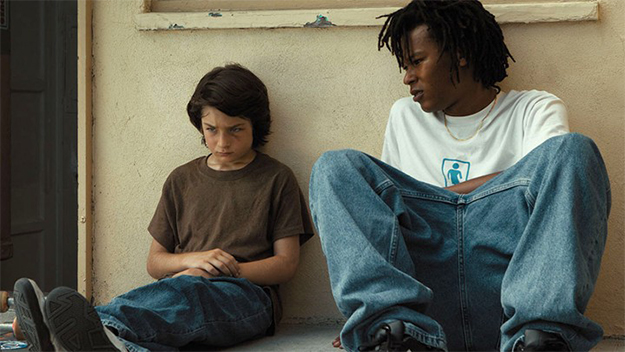
Like a Jules Dassin for Young Adults, Hill has a talent for suggesting violence percolating beneath a tension-filled surface, then boiling over for maximum punch. Stevie’s surprising ability to handle social pressure is what gives him his skateboarder nickname. An Anglo member of the gang, “Fourth Grade” (Ryder McLaughlin), so named for his supposed intelligence level, asks the mixed-race “Fuckshit” (Olan Prenatt), named for his favorite compound expletive, and the African-American Ray (Na-kel Smith), so cool he doesn’t need a nickname, whether black people get sunburned. Ray puts the young outsider Stevie on the spot by asking him the same question—and quick-witted Stevie replies, “What are black people?” I suppose he could have been called “Sidestep,” but Ray, the leader of the pack, dubs him “Sunburn.”
This crew provides a haven for Stevie/Sunburn because it heals the wounds that individual skateboarders inflict on each other, not because they’re free of brutal competition. Ruben (Gio Galicia), the youngest skateboarder in the gang before Stevie joins, develops a corrosive jealousy of his new friend’s mental dexterity and physical courage, because these qualities endear Stevie to Ray and Fuckshit. Meanwhile, Ray, who has developed considerable street wisdom and is serious about turning pro, has begun to doubt Fuckshit’s mettle after he gets crazy-drunk, hands out free samples of his ADD medication, and declares that he has no ambition except to “live the life.”
Hill is not a judgmental director. He doesn’t belittle any of their life plans, whether it’s Ruben’s assumption that he’ll follow his dad into a job at the DMV, or Fourth Grade’s goal to document everything on his camcorder and become the next Steven Spielberg. And Hill doesn’t over-romanticize a callow, scruffy bunch of kids. Stevie/Sunburn’s family is his school of hard knocks; with his buddies he simply shows off the bounce-back he learned there. In one audacious sequence, he follows Ray and Fuckshit after they skate over a gap between rooftops. Stevie doesn’t make it over and falls into the gap and onto a ground-floor picnic table. Like an old Timex watch, he takes the licking and keeps on ticking. Ray is the one who ultimately tells him he doesn’t have to test himself by standing up to “the hardest hits.”
Ray has the soft-spoken shrewdness of a born tutor. After Dabney roars into his skate shop and screams out her warning never to get Stevie drunk again, Ray frames the incident with great tact: he says, “Your mother is serious.” Skateboarding also is a healing motif in Don’t Worry, He Won’t Get Far on Foot, and Ray has some of counselor Donnie’s horse sense: he tells the crestfallen Stevie to comprehend that his friends have things just as bad or worse, like Fourth Grade, who can barely afford socks.
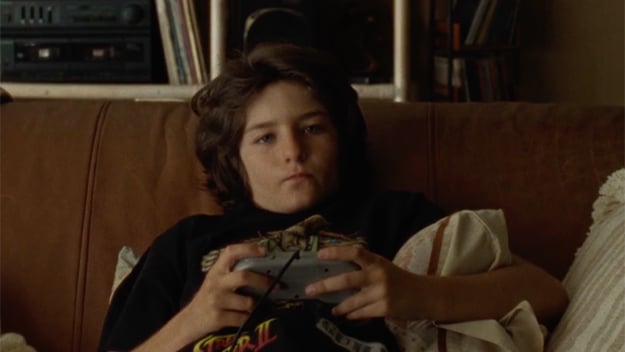
The movie is serious, too, but not deadly so. It includes an uproarious insult-match between a security guard (the uncredited Jerrod Carmichael) and the gang. At one point the rent-a-cop puts down Fuckshit’s “Sheryl Crow hair,” but Fuckshit doesn’t know who Sheryl Crow is. Hill delicately and insightfully navigates us through an unchaperoned party in which an older girl, Estee (Alexa Demie), gives Stevie/Sunburn his sexual initiation. Stevie is nervous right up to the second when Hill judiciously cuts away, and though the boy says he’s a gentleman who would never “kiss and tell,” his real orgasm comes when he tells his buds how far he went with her.
Mid90s has just enough visual dimension: Hill captures the geometric eeriness of L.A.’s suburban-urban style and the hypnotic action poetry of the skateboarders’ weaving and whirling. And his young actors dive into a dramatic cauldron headfirst, without any hesitation or youthful vanity. Hill doesn’t know how to complete certain scenes and finish off the movie. It builds to an accidental catastrophe that feels unearned, leading to an unlikely epiphany when our antihero’s mother decides the skateboarders are his true support team, after all.
Yet throughout, there are eloquent scenes of yearning and despair. In the most harrowing scene, Fuckshit brushes up against Ian at an outdoor burger joint. Fuckshit doesn’t know that Ian is Stevie’s sibling. Ian is about to react to the accidental contact in his youthful macho way when he sees his kid brother sitting with the rest of the skateboard crowd. He throttles his wrath, but we know all hell will break loose when the brothers go home. Mid90s turns YA uncertainty into ferocious adolescent tragicomedy.
Michael Sragow is a contributing editor to Film Comment and writes its Deep Focus column. He is a member of the National Society of Film Critics and the Los Angeles Film Critics Association, and a contributor to the Criterion Collection.



